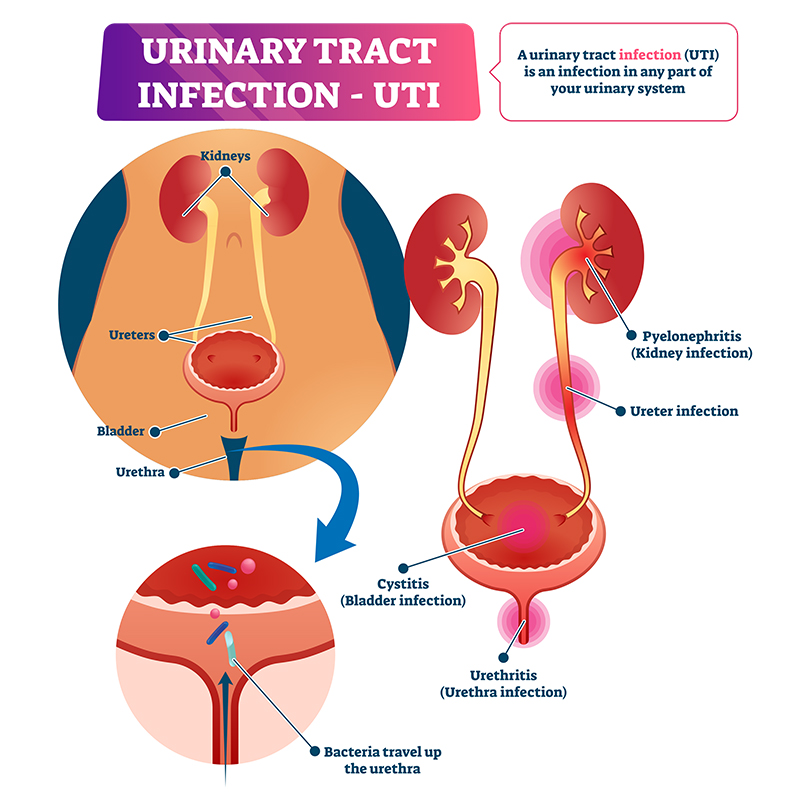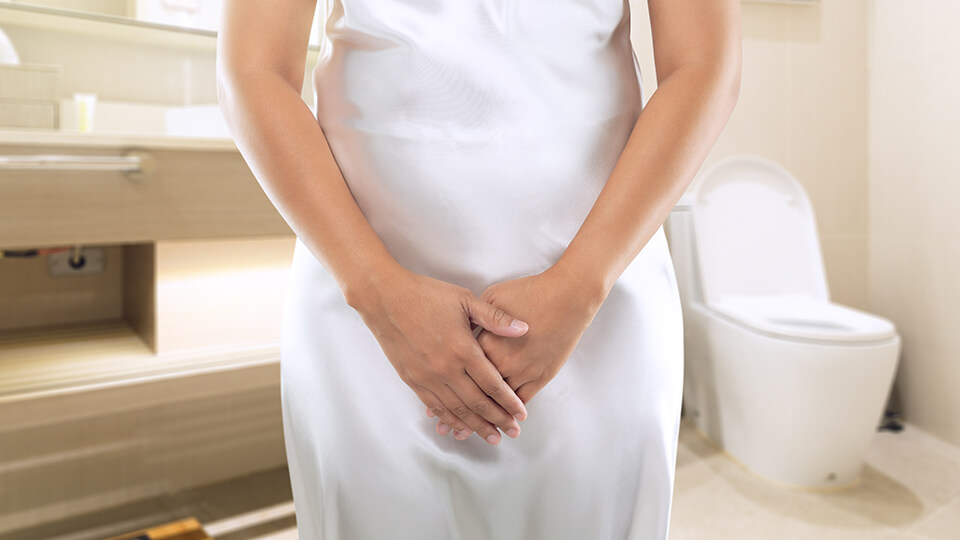Urinary Tract Infections (UTI): Symptoms, Diagnosis and Treatment
- What Is a UTI?
- How Does a UTI Develop?
- Am I At Risk Of Developing a UTI?
- UTI Symptoms
- How Is a UTI Diagnosed?
- What Are The Possible Complications Of a UTI?
- How Do I Prevent UTI?
- Frequently Asked Questions on UTI?
What is a UTI?
A urinary tract infection (UTI), also known as a bladder infection, is an infection in any part of your urinary system. To specify, your urinary system includes your kidneys, ureters, bladder, and urethra. Your urinary tract is the path your urine flows. In every case, your urine forms in your kidneys. They are located around your mid to lower back. First, your kidneys rid your blood of waste and extra fluids. Then your kidneys turn what is left into urine. Next, the urine travels from the kidneys through two tubes, called ureters. Afterwards, the ureters empty into your bladder. Then your bladder stores the urine.
Once your bladder is full, you feel the urge to pee. Finally, the urine travels from your bladder through a tube that carries the urine from your bladder to the outside of your body. To be clear, this tube is called the urethra. The urethra in women is shorter than the urethra in men. As a result, UTIs are more common in females than males, as there is a shorter distance for bacteria to travel.
Since there are many parts of the urinary system, infections can occur in different areas. To start, an infection in the urethra is called a urethritis. However, an infection in the bladder is called cystitis. A bladder infection may spread to the ureters and kidneys. Oftentimes, this leads to an infection of the kidneys called a pyelonephritis.
How does a UTI Develop?
Most infections start in the lower urinary tract, which is the urethra and bladder. Evidently, bacteria living in your bowels and anus can travel from the anus to the opening of your urethra. Then the bacteria travels through the urethra and up to your bladder. In fact, a common practice that causes UTIs to develop like this is wiping the wrong way. For this reason, it is important to always wipe from front to back after urination or bowel movements. Once the bacteria travels from the anus towards the urethra, an infection occurs within the urethra and bladder.
On the contrary, kidney infections are less common. Yet they are more severe and can be fatal. Overall, the most common type of UTI is a bladder infection.

Types of UTI- Urethritis, Cystitis (bladder infection), Pyelonephritis
Am I at Risk of Developing a UTI?
Most women will have UTIs at some point in their adult life. However, if you find that you are getting UTIs several times a year, you may have some predisposing condition that makes UTIs more likely. You and your doctor can figure out why you have frequent or recurrent UTIs.
Women at High Risk of UTI
Anyone can get a UTI. However, they are more common in women. In addition to being a women, there are other factors that put people at risk for UTIs. For example, your risk increases if you:
- Are between 20 and 50 years old.
- Do not or cannot move. To explain, residents in nursing homes are at high risk for UTIs.
- Have kidney stones.
- Are pregnant or experiencing menopause.
- Have a neurological condition that affects the nerves of the bladder. For instance, conditions include diabetes, multiple sclerosis, or spinal cord injuries.
- Have a urine blockage. For example, a kidney stone or a narrow urethra could be the cause.
- Do not drink enough liquids or empty your bladder properly.
- Have bowel incontinence or an inability to control bowel movement.
- Are sexually active.
- Have multiple sex partners.
- Use certain birth control, such as a contraceptive diaphragm or spermicides.
- Have certain sexually transmitted infections, like chlamydia.
How Do I Know If I Have a UTI? (UTI Symptoms)
UTI symptoms are usually subtle at the start. But they get worse the longer you go untreated. In many cases, the most common symptoms of a UTI are painful and frequent urination. Usually, the pain may feel more like pressure or aching over your bladder. And you may also feel burning or stinging when you urinate. In addition to pain, you may need to urinate more often. But you may only pass urine a little at a time. This is quite common. Also, your urine may appear cloudy or bloody. Likewise, your urine may have a strong odor.
Further, urinary urgency is another common symptom. Urinary urgency is when you have a hard time holding your urine. When you want to pee, you have to find a bathroom right away. Again, you may only pass a small amount of urine despite the strong urge.
On the other hand, low back pain and pain along either side may mean that you have a more serious kidney infection. Kidney infections can also cause other symptoms. For example, you may experience a fever, chills, nausea, and vomiting. So, if you start to have any of these symptoms, contact your doctor as soon as possible.

Symptoms of a UTI
- Painful Urination.
- Frequent Urination.
- Urinary Urgency- need to urinate right away when you have the urge to void.
- Urine Odor.
- Cloudy or Bloody Urine.
- Low Back Pain or Pain along either side.
- Fever, chill, nausea, vomiting.
How is a UTI Diagnosed?
If you have symptoms of a bladder infection, you need to contact your doctor. Oftentimes your doctor may treat you based on your symptoms without you coming into the office. But if you have symptoms of a kidney infection, that is more serious. As a result, you will need an urgent evaluation and treatment.
In the office, your doctor may do a test called a urinalysis to find out if you have a UTI. You will get the results of a urinalysis right away. But this is not the most accurate test. Your urine sample may get sent for a second test. On average, it takes about three days to get the result. This second test is called a urine culture and is more accurate. Not only will your urine culture results indicate a UTI. But they will also tell your doctor which antibiotic is best for you. In most cases, you will start an antibiotic right away. However, if the urine culture results indicate that the initial antibiotic you started will not work for you, your doctor will switch to a more appropriate one.
How is a UTI Treated?
Most UTIs are caused by a bacterial infection. So, antibiotics are the main treatment. There are many different types of antibiotics. And your doctor will use three factors to decide which one is best for you. First, the doctor will consider the type of infection you have. Second, your urine test results impact the type of antibiotic you take. And third, your allergies will get rid of any drugs that you can’t take.
For more severe infections, such as a kidney infection, you may need to be treated with antibiotics through an IV at a hospital. In addition to treating the infection, your doctor may also prescribe medication to help with bladder pain. Most UTIs improve very quickly once antibiotics are started. Usually, you start feeling better within two days. But it is important to complete your treatment, even if you feel better. This will prevent the recurrence of stronger UTIs that will be harder to treat.
What Are The Possible Complications Of A UTI?

Usually, UTIs don’t lead to complications when treated promptly and properly. But if untreated, UTIs can lead to organ damage and be fatal. Further, untreated kidney infections can lead to scarred, damaged kidneys that can cause improper renal function. Also, UTIs can spread to your blood. Once an infection has spread to the blood, the blood can carry that infection to many other organs within your body. Further, an infection in the blood, called sepsis, may occur. Sepsis is a serious condition that can be fatal. So, it requires stronger and longer treatment.
Recurrent UTIs can lead to the need for continued use of antibiotics. As a result, resistant bacteria and other serious side effects to chronic prescription drug use may occur. Additionally, untreated UTIs during pregnancy can cause preterm labor, preterm delivery and respiratory failure. So, it is important that all UTIs be treated to prevent these possible complications.
Potential UTI Complications
- Kidney Damage.
- Sepsis- infection in the blood.
- Recurrent UTI.
- Pregnancy Complications:
- Preterm Labor.
- Preterm Delivery.
- Respiratory Failure.
How Do I Prevent UTI?
- Practice good personal hygiene.
- Maintain a clean, dry genital area.
- Wear cotton underwear.
- Always wipe from front to back after urinating or a bowel movement.
- Drink plenty of water. Drinking water dilutes your urine. And it allows bacteria to be flushed from your bladder wall before an infection can start.
- Avoid sugary drinks.
- If you are prone to UTIs, avoid using birth control methods. For example, do not use a contraceptive diaphragm and spermicidal jelly.
- Stop douching or use of similar feminine hygiene products.
- Avoid bubble baths as they can irritate the urinary tract.
- Urinate right before and after sexual intercourse.
- Drink unsweetened Cranberry Juice. It is not yet known if this helps to prevent UTIs. Studies are inconclusive. Cranberry juice will not treat an existing UTI.
Copyright: myObMD Media, LLC | Written by: Tolu Amzat, MD | March 31st, 2021 | Edited by: Dayna Smith MD
Glossary:
- Kidney: Bean shaped organs that filter the blood to remove waste that becomes urine.
- Ureter: A pair of tubes, each leading from one of the kidneys that carry urine to the bladder.
- Urethra: A tube-like structure that connects to the bladder through which urine flows to leave the body.
- Bladder: An organ where urine is stored.
- Urethritis: Infection of the urethra.
- Cystitis: Infection of the bladder.
- Pyelonephritis: Infection of the kidney.
References
- Foxman B. Urinary tract infection syndromes: occurrence, recurrence, bacteriology, risk factors, and disease burden. Infect Dis Clin North Am 2014; 28:1.
- Gupta K, Hooton TM, Naber KG, et al. International clinical practice guidelines for the treatment of acute uncomplicated cystitis and pyelonephritis in women: A 2010 update by the Infectious Diseases Society of America and the European Society for Microbiology and Infectious Diseases. Clin Infect Dis 2011; 52:e103.
- Arnold J, Hehn, L, Klein D, Common Questions About Recurrent Urinary Tract Infections in Women. Am Fam Physician. 2016 Apr 1;93(7):560-569.
- Patel A. Management of Urinary Tract Infections in Women. US Pharm. 2007;32(9):26-33.
- Glover M, Moreira CG, Sperandio V, Zimmern P. Recurrent urinary tract infections in healthy and nonpregnant women. Urol Sci. 2014;25(1):1–8.
- ACOG Practice Bulletin No. 91: Treatment of urinary tract infections in nonpregnant women. Obstet Gynecol. 2008;111:785–94


